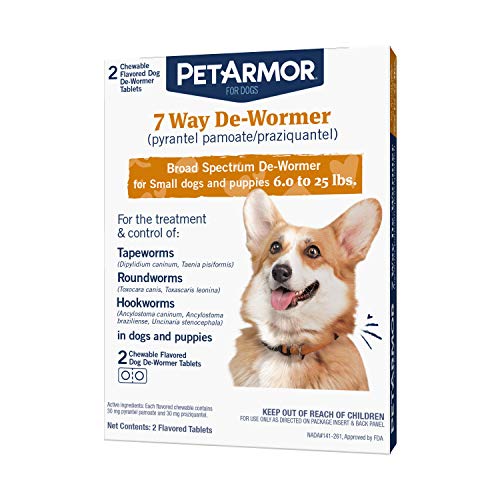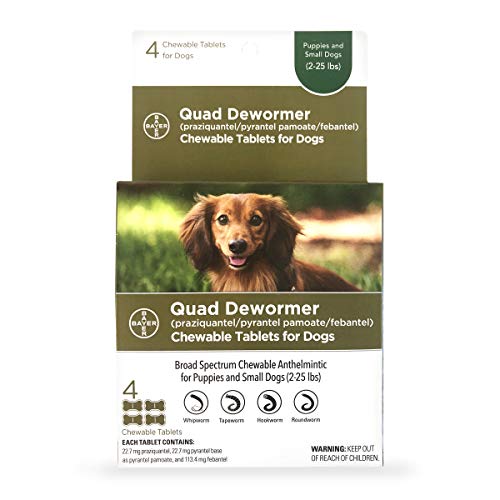If you’ve ever raised a dog or a puppy, you’ll be well aware that when their mouths wander practically everywhere, the majority of it is disgusting and contains hookworms. If you’re wondering Can I Give My Dog Dewormer If He Doesn’t Have Worms, this is the article you need!
In this article, we will talk about:
- Can I Give My Dog Dewormer If He Doesn’t Have Worms?
- How Often Should You Deworm Your Dog?
- What Are The Signs That Show That Your Dog Has Worms?
- What To Expect After Giving A Dewormer To Your Dog
Can I Give My Dog Dewormer If He Doesn’t Have Worms?
If you give your dog or puppy a dewormer even if you’re sure he doesn’t have worms, don’t worry. The medicine will simply get digested and cause no harm unless it is in super large quantities compared to the amount prescribed. The dewormers we give usually are intestinal or hookworms dewormers the dogs need.
Can I Give My Dog Dewormer If He Doesn’t Have Worms?
If you’re well aware that your dog doesn’t have any worms and you’re just deworming them as a precaution, go ahead. Since oral dewormers aren’t quickly absorbed into the circulatory system (as they need to work in the bowels, to begin with), the medicine would simply pass through and have no effect.
However, if you are giving your dog a dewormer just as a precautionary measure, you need to be careful. Giving a dewormer could be problematic if it is provided 10x to 30x times the regular prescribed dosage.
As per Dr. Jennifer Coates, DVM, below are the adverse effects of providing excessive dewormers to dogs:
- Diarrhea
- Vomiting
- Irritation on the skin
- Weakness and lethargy
- In worst cases, it can also cause stomach ulcers, kidney and liver damage
If your dog was recently dewormed and there are no signs of worms in his poop, skin, or anyplace else, and you would like to be especially careful, we recommend waiting at least 15 days after the first dose.
Deworming should be done on a regular basis to keep your pet safe.
How Often Should You Deworm Your Dog?
Deworming your dog depends upon a variety of factors such as the ones below, and the frequency will be determined accordingly.
1. Monthly Deworming Treatment
As per Dr. Hector Joy, DVM, it is important that monthly deworming be carried out in dogs. Most heartworms and intestinal parasites have a lifecycle of 3 to 4 weeks. By deworming a dog monthly, you can prevent the occurrence of these parasites.
As per Dr. Hector, the advantages of a monthly deworming cycle are as follows:
- Monthly medication avoids the growth of considerable parasite densities in the animal (and thus in the animal’s surroundings)
- Makes the procedure more user-friendly, allowing people to remember to medicate their pets.
You can check out this No products found. for dogs. It is always a good idea to first consult a vet though.
2. Consider the Risk Of Infection Where You Live
It is important to understand the risk of infections where your dog lives.
In low-risk houses, deworming treatment is based on fecal test results. In this case, an annual deworming treatment, once or twice a year is recommended.
If your house and the surroundings are more prone to causing worms in your dogs, it is best to perform fecal testing on your dog, 3 to 4 times per year. The medication will be suggested by the vet on the basis of the results.
3. Customizing the Frequency of Deworming Medications
There isn’t a clear solution for deworming your dog. There is no way to appropriately manage the dangers for all pets (and people) in all places with a “one programme fits all” strategy. The rational solution is to customize your deworming method to your pet while considering the following:
- In your region, what are the parasite risks?
- Are these dangers present all year or only during certain seasons?
- What kinds of worms do you have in your neighborhood?
- Is anyone at risk of contracting parasites from dogs or other pets?
- What is the pet’s age?
Check out this video to understand how often should you deworm your dog based on the above-mentioned factors.
What Happens If You Give A Dog Too Much Wormer?
If you give too much dewormer to your dog, it is possible that your dog will vomit, or will have stomach and intestinal issues as per Dr. Rania Gollakner, BS, DVM, MPH.
Another possibility is also that the dog may become extremely sick. The side effects of giving excessive dewormer to a dog are more noticeable if your dog has some underlying health issues.
Hence, it is always advisable to weigh the pros and cons and consult a vet before giving a dewormer to your dog. A dog with other health issues is bound to feel a lot weaker if excess dewormer is given.
Also Read: How to make your dog smell good without a bath
What Are The Signs That Show That Your Dog Has Worms?
While each parasite has a distinct impact on dogs, there are certain common warning signs that dog owners should be mindful of. According to Dr. Hector Joy, DVM worms in the intestines can cause:
- Diarrhea
- Pain in the abdomen
- Loss of weight
- Coughing
- Appetite shifts
- Vomiting
- The look of the coat is poor.
- Having a potbellied look
- Lack of energy
- Dehydration
- Nutritional deficiencies and anemia
- Stool with blood (either bright red or darker purple)
- Gums that are pale
How Long Should I Wait To Feed My Dog After Deworming?
Dogs may vomit quickly after receiving the deworming dose, just like they do with any other oral treatment. If your dog is a pup or has a history of snacking too quickly and being sick, keep an eye on him.
Your puppy may have next to no appetite following deworming. This is a common symptom of the drug and is no cause for concern. You should, however, check to see if your dog is eating or wanting to eat after around 2 to 3 hours.
What better way to entice them towards the bowl than to prepare a special supper for them? It’s a great idea to make your dog’s favorite food once they’ve been dewormed. It will not only motivate them to eat, but it would also make them feel better.
How Long Do Dog Worming Tablets Take To Work?
If your dog has processed the intestinal parasites medication, you will start seeing effects right away. The majority of treatments work quickly, eliminating intestinal worms within 2 to 6 hours of applying the de-wormer.
However, based on the intensity of the infestations and the type of parasites you’re trying to cure, it could take anywhere from a few nights to up to 2 weeks for your dog to be worm-free.
What To Expect After Giving A Dewormer To Your Dog?
Your pet may pass out lifeless parasites in their feces after being wormed. Although the image is unappealing to look at, it is perfectly natural and nothing to be concerned about.
The worms may occasionally exhibit some activity, such as a flipping motion, but they will eventually die.
Apart from this, if we talk about the general behavior of your dog, you can expect your dog to show a lack of appetite since its body is fighting against the parasites. Also, your dog can have nausea and vomiting. However, these symptoms should persist only for about 24 hours. In case your dog shows any more discomfort after 24 hours, please consult a vet.
Also Read: How Many Times A Day Should A Dog Poop
How Long Will My Puppy Poop Worms After Deworming?
You’ll undoubtedly want to know how much time your dog will continue to excrete worms after you’ve dewormed him. Puppies usually defecate worms for a couple of days after being dewormed.
The majority of treatments work quickly, killing intestinal worms within 2 to 6 hours of applying the dewormer. Will my dewormed dog or puppy pass bugs? Dog wormers work in a variety of ways, says Dr. Hector Joy, DVM. Some immobilize and suffocate the worms, resulting in worms in your dog’s feces.
The length of time it takes to get clear of worms in your dog after they’ve all been pooped out is determined by the severity of the issue. In minor cases, the medication could take as short as 2 hours to start the job and as long as 12 hours for all of the parasites to come out in their stool.
Puppies commonly excrete worms for a few days since the worms die off in 2 to 14 hours. It’s not uncommon for worms to be passed out for up to a week after they’ve been fed.
However, up to the week after medication, you could still find parasites in your puppy’s feces. This is perfectly normal and must not cause you any concern.
You might even see parasites in your puppy’s stool after deworming for a while. If the worm issue is severe, you may have to repeat procedures, which could take up to 2 weeks for your dog to be completely rid of worms.
Because oral anti-parasitics only last a few hours within your dog’s body, a second dosage must be given at least every fortnight to ensure that inner parasites are effectively eliminated.
What Happens If You Don’t See Worms After Deworming?
You may or may not detect worms in your pet’s feces in the days following a worming medication, depending on the type of worms they have.
Some intestinal worms, such as hookworms and whipworms, are so tiny that you won’t even notice them in your dog’s poop. So don’t worry. Your dog will be fine.
Also Read: How long after eating should a dog poop
How Can You Treat Intestinal Worms In Your Dog?
Always get advice from your veterinarian regarding the best medication for your dog. Dr. Hector Joy, DVM absolutely trusts dewormer medications.
These can be given as an injection, a pill, or a surface treatment. Check that you are delivering the correct dose for your pet’s body mass when using pet store items and that you know which type of worm is handled by each prescription.
Take a look at this No products found. that I found online which you can use to treat intestinal worms in a single dose.
All common intestinal worms in dogs, including adults and larvae of ringworm and hookworms, are killed by an intestinal worming procedure.
Should You Deworm Your Dog At Home?
It’s important to note that the specialist will assess your pet’s physical health, weight, and lifestyle choices, as well as whether or not it lives with youngsters. They can then determine which anti-parasitic is ideal for your dog based on this information.
Always consult your primary care veterinarian to prevent your dog from worms and to remain informed on your dog’s medical plan.




